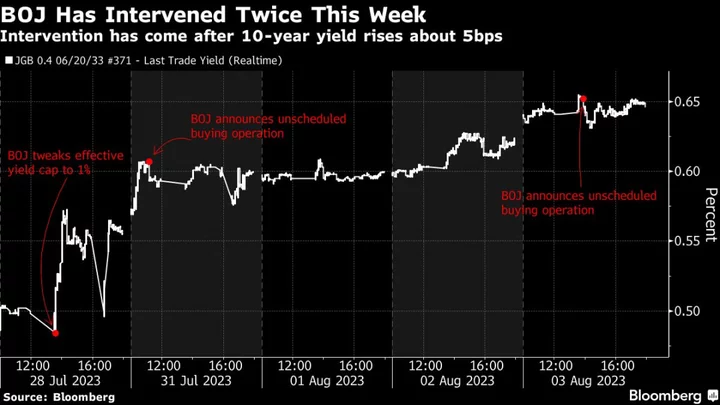
Bond Traders Eye 5 Basis Points as BOJ Intervention Trigger
Bond traders are on guard for a further five-basis-points increase in benchmark Japanese bond yields amid speculation that
2023-08-04 15:22
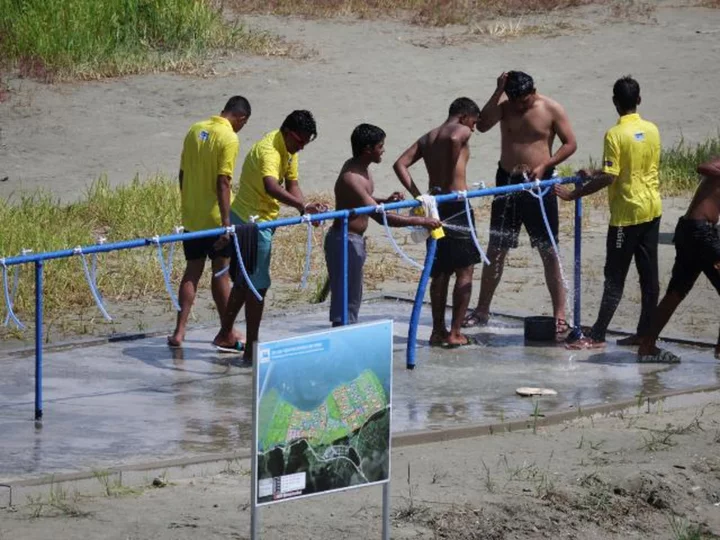
Hundreds of teenagers are falling ill from heat wave at World Scout Jamboree in South Korea
Hundreds of teenage boy and girl scouts have fallen ill at a global event in South Korea as a sweltering heat wave sweeps the country, angering some parents who have called for the 12-day event to be canceled.
2023-08-04 14:45
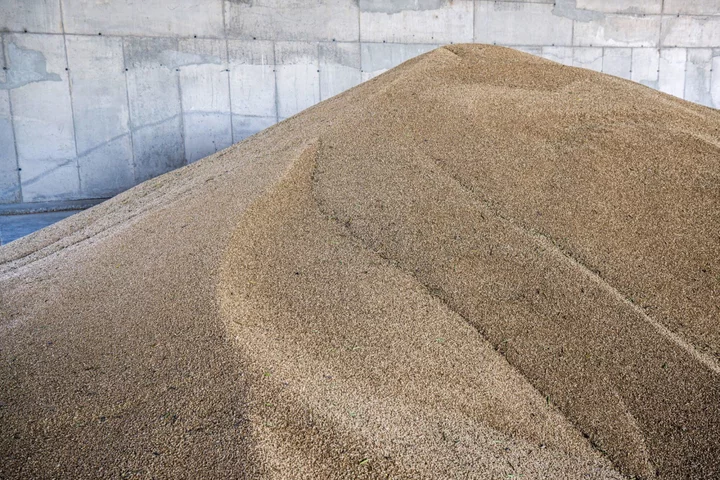
Wheat Gains as Russia Halts Novorossiysk Port Traffic on Attack
Wheat futures rose after the Novorossiysk port was closed to marine traffic by Russian authorities following a drone
2023-08-04 14:19
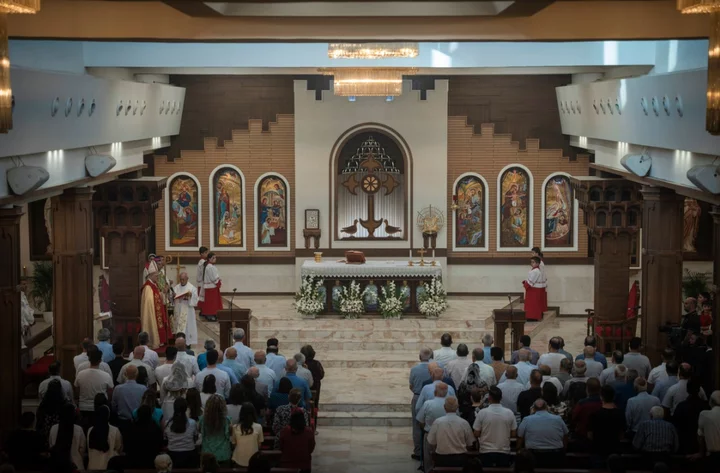
A feud between a patriarch and a militia leader adds to the woes of Iraqi Christians
Iraqi Christians have struggled since the Nineveh plains, their historic homeland of rolling hills dotted with wheat and barley fields, were wrested back from Islamic State extremists six years ago. Although the threat from IS has receded, some towns are still mostly rubble. There are few inhabited homes or basic services, including water. Many Christians have given up and left for Europe, Australia or the United States. Others are trying to follow. Now the shrinking religious minority that was also violently targeted by al-Qaida before the rise of IS has been rocked by yet another crisis in the form of a political showdown between two influential Christian figures — a Vatican-appointed cardinal and a militia leader, with land and influence at the core of the drama. The dispute adds to the woes of Iraqi Christians, who have often felt sidelined in the political order. A 2021 visit by Pope Francis provided a glimmer of hope that quickly faded. Meanwhile, the Christian population has plummeted. The number of Christians in Iraq today is estimated at 150,000, compared to 1.5 million in 2003. Iraq’s total population is more than 40 million. The political tension rose last month when Cardinal Louis Sako withdrew from his headquarters in Baghdad to northern Iraq’s semi-autonomous Kurdish region after Iraqi President Abdul Latif Rashid revoked a decree recognizing his position as patriarch of the Chaldeans, Iraq’s largest Christian denomination and one of the Catholic Church’s eastern rites. Sako said he will not return to Baghdad until his recognition is reinstated. His departure added to the feeling of helplessness among many Christians. “Of course, this affects us psychologically,” said Sura Salem, a Christian social activist in Baghdad. “You feel like a family without a father.” Christians staged a small protest in Baghdad over Sako’s departure, but Salem said “listening to the voice of the Christians is the last concern” of Iraqi leaders. Sako blames a campaign against him by Rayan al-Kildani, a fellow Chaldean Christian who formed a militia called the Babylon Brigades that fought against IS and still patrols much of the Nineveh plains. The group is affiliated with the Popular Mobilization Forces, a collection of primarily Shiite, Iran-backed militias. Its associated political party, the Babylon Movement, won four of five Christian-designated seats in Iraq’s 2021 parliamentary elections. Sako believes al-Kildani is angling to take over Christian endowments and properties. Al-Kildani has made similar allegations about Sako. “I have stood up to this militia and others who wanted to take over what rightfully belongs to the Christians,” Sako told The Associated Press, days after arriving in Irbil to a warm welcome from Kurdish officials. “Of course, no one defends Christians other than the church.” In Baghdad's upscale Mansour neighborhood, al-Kildani was busy building political alliances. On a recent afternoon, several couches in the palatial lobby of his party headquarters were occupied by well-dressed women wearing hijabs, beneath a painting of the Last Supper and a portrait of al-Kildani. One by one, the women entered the inner office, each one emerging with a gift bag. One of the visitors explained that they were political candidates interested in running on al-Kildani’s list in Mosul in December’s provincial elections. After the visitors departed, a smiling and courtly al-Kildani made his entrance. He insisted that he had no role in the withdrawal of the patriarch's decree and dismissed allegations that he was seeking to seize church lands. “I am the son of this church, and it is my duty to respect it, but it is unfortunate when a clergyman accuses someone without proof,” he said. Al-Kildani has accused Sako of selling off church properties, allegations the patriarch denies, and he has filed a lawsuit against Sako alleging slander. But al-Kildani said he is ready to meet with Sako to reconcile. Sako rejected the suggestion. Al-Kildani ”has a militia, and his loyalty is not to the church,” the patriarch said. “He is not a respectable person." The Iraqi president has downplayed his revocation of Sako's recognition as bureaucratic housekeeping, claiming it did not diminish the patriarch’s legal or religious status. The Vatican has remained largely silent. Its embassy in Baghdad said in a statement that the Iraqi Constitution guarantees that the heads of churches can administer church properties. A senior Vatican official, who spoke on condition of anonymity because he was not authorized to comment to the media, said the decree was unnecessary given the constitutional guarantees. He said the Holy See did not want to get involved in the dispute but had invited Sako to tamp down tensions with the Iraqi authorities for the sake of Iraqi Christians. The United States sided with Sako. State Department spokesman Matthew Miller said last month that the U.S. is concerned that Sako’s position "is under attack” by a militia leader who in 2019 was slapped with U.S. sanctions for his alleged involvement in human rights abuses, including cutting off a captive’s ear. Al-Kildani denied the allegations and accused the international community of being ungrateful after his group’s role in the fight against IS. He accused the Kurdish Democratic Party — the ruling party in the Kurdish region and a rival of the Iraqi president's Patriotic Union of Kurdistan Party — and the United States of engineering Sako’s withdrawal from Baghdad for political reasons. For some Christians, the drama is overshadowed by more pressing problems. As Baghdad resident Anan al-Dawi left a sparsely attended Mass on Sunday, her main concern was a recent power outage in the scorching summer heat. She struck a diplomatic tone regarding the feud between Sako and al-Kildani. Although physically absent, she said, Sako “lives in all of our hearts.” As for al-Kildani's group, she said: “I serve the country in my way. You serve it in yours, and they are also serving their country." Back in the Nineveh plains, in the town of Batnaya, patrolled by members of Kildani's militia, Lawrence Sabah owns a small factory where he makes mop handles out of wood imported from Russia. Sabah did not share his opinion on Sako or al-Kildani, but he had other complaints. “There are no services, even the water sometimes doesn’t come, and 70 or 80 percent of the houses were destroyed,” he said. He is hoping to join his parents and siblings, who have resettled in California. Some 8 kilometers (5 miles) to the north, in Kurdish-controlled territory, Raad Ekram owns an electrical supply store in the sparsely populated town of Telskof. When his family was displaced from the village to the city of Dohuk, Ekram believes he got short shrift from both the Iraqi government and the church. “We never saw the patriarch,” he said. “Of course, I don’t accept what happened to him ... and I don’t accept for him to be harmed.” But the patriarch "didn’t do everything he should have done for us.” He is encouraging his children to seek their fortunes abroad. “There’s nothing left in Iraq," he said, "especially for the Christians.” ___ Associated Press writers Nicole Winfield in Rome and Matthew Lee in Washington contributed to this report. ___ Associated Press religion coverage receives support through the AP’s collaboration with The Conversation US, with funding from Lilly Endowment Inc. The AP is solely responsible for this content. Read More Ukraine war’s heaviest fight rages in east - follow live Charity boss speaks out over ‘traumatic’ encounter with royal aide Biden's inaction on death penalty may be a top campaign issue as Trump and DeSantis laud executions On 3rd anniversary, Beirut port blast probe blocked by intrigue and even the death toll is disputed Mega Millions players will have another chance on Friday night to win a $1.25 billion jackpot
2023-08-04 13:50

Selloff in Long-Maturity Treasuries Squeezes Recession Wagers
The Treasury yield curve has become far less inverted this week, but the shift is unnerving investors as
2023-08-04 13:18
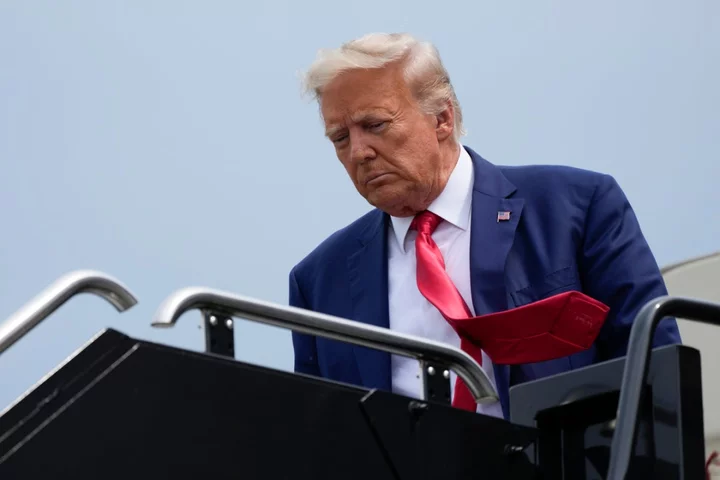
Trump appears to stumble over his name and age at arraignment
Donald Trump appeared to stumble over his words when he was asked to state his full name and age at his arraignment on charges of attempting to overturn the 2020 election. Mr Trump arrived at the E Barrett Prettyman federal courthouse in Washington DC on Thursday where he pleaded not guilty to four criminal counts of an alleged election hoax conspiracy that led to the January 6 riots at the US Capitol. Mr Trump, dressed in his trademark navy blue suit and red tie, entered the courtroom at 3.51pm accompanied by John Lauro, a veteran Washington-based criminal defence attorney, and Todd Blanche, the New York-based lawyer who is leading his defence in the other criminal cases against him. He was made to wait about 25 minutes before the magistrate judge entered the room at 4.15pm, and appeared nervous and fidgety. After attorneys for the government and defence introduced themselves, Mr Trump stood to take his oath from a courtroom deputy. US Magistrate Judge Moxila Upadhyaya then asked the former president to state his full name. “Donald J Trump — John — Donald John Trump,” Mr Trump replied hesitantly. He was then asked for his date of birth, and tripped over his words again. At first, he said “seven seven,” before correcting himself and saying “77”. After explaining his rights to remain silent and to legal representation, and reminding him of the lengthy prison sentence he faces if convicted, Judge Upadhyaya asked Mr Trump if he understood. He replied in the affirmative. Mr Lauro then entered a plea of not guilty on all counts on his behalf. Prosecutors did not seek to detain Mr Trump, and set a date of 28 August for a first hearing before Judge Tanya Chutkan. Mr Trump is not required to attend. In comments to reporters afterwards, Mr Trump described it as a “very sad day” before claiming Washington DC had deteriorated in the two and a half years since he left office. “This was never supposed to happen in America.... if you can’t beat ‘em, you persecute them,” he said. As his motorcade returned to Ronald Reagan Washington National Airport, it was met with a chorus of insults from a small group of protesters. “F** you, terrorist,” one man yelled, according to Wall Street Journal reporter Andrew Restuccia. Earlier this week, Mr Trump was charged with conspiracy to defraud the United States, witness tampering, conspiracy against the rights of citizens, and obstruction of and attempt to obstruct an official proceeding in relation to his attempts to overturn the results of the 2020 presidential election. The indictment also described six unnamed co-conspirators, who have been identified from details contained in the document as New York City Mayor Rudy Giuliani, former Mr Trump lawyer John Eastman, “Kraken” lawyer Sidney Powell, former top Justice Department official Jeffrey Clark, and attorney Kenneth Chesebro. Mr Trump has claimed in a series of unhinged posts to Truth Social that President Biden and the US Department of Justice had “weaponised” the federal government against him. Read More Live: Trump pleads not guilty at arraignment after arrest Trump pleads not guilty to federal conspiracy charges in plot to overturn 2020 election Who is Jack Smith? The special prosecutor who just indicted Trump again
2023-08-04 12:58
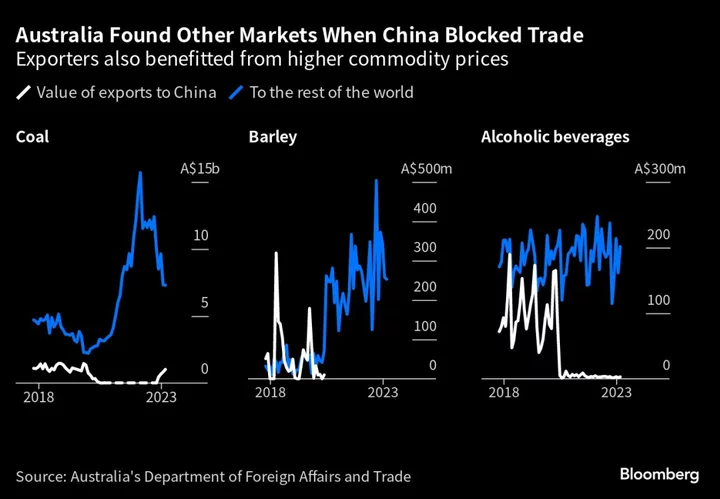
China Scraps Australian Barley Tariffs in Place Since 2020
China will scrap anti-dumping and anti-subsidy tariffs on Australian barley, effective from Aug. 5, China’s commerce ministry said
2023-08-04 12:54
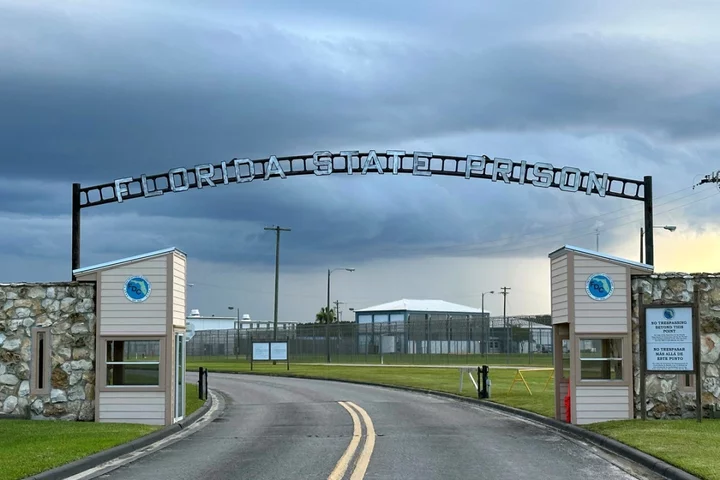
Florida executes man for 1988 murder of nurse who was sexually assaulted, killed with hammer, set on fire
A Florida man who recently dropped all legal appeals was executed Thursday for the 1988 murder of a woman who was sexually assaulted, killed with a hammer, and then set on fire in her own bed. James Phillip Barnes, 61, was pronounced dead at 6.13pm following a lethal injection at Florida State Prison in Starke. Lying on a gurney, Barnes appeared to already have his eyes shut when the curtain was opened for witnesses. He didn't respond when prison officials asked if he had a final statement, and he remained motionless except for breathing for about 10 minutes until that stopped. A doctor then pronounced him dead. The 61-year-old inmate was sentenced to death for the murder of nurse Patricia “Patsy” Miller. It was the fifth execution in Florida this year. One of the victim's siblings, Andrew Miller, witnessed the execution and said he came to remember his sister. “I did not come here to watch someone die. I came here to honor our sister, Patricia Miller,” he told reporters afterward. “No one should live in fear within the safety of their own home. No woman, no child, no animal should have that fear. We did.” Barnes was serving a life sentence for the 1997 strangulation of his wife, 44-year-old Linda Barnes, when he wrote letters in 2005 to a state prosecutor claiming responsibility for killing Miller years earlier at her condominium in Melbourne on Florida’s east coast. Barnes represented himself in court hearings where he offered no defense, pleaded guilty to killing Miller and did not attempt to seek a life sentence rather than the death penalty. Miller, who was 41 when Barnes killed her on April 20, 1988, had some previous unspecified negative interactions with him, according to a jailhouse interview he gave German film director Werner Herzog. “There were several events that happened (with Miller). I felt terribly humiliated, that’s all I can say,” Barnes said in the interview. When he pleaded guilty, Barnes told the judge that after breaking into Miller’s unit, “I raped her twice. I tried to strangle her to death. I hit her head with a hammer and killed her and I set her bed on fire,” according to court records. There was also DNA evidence linking Barnes to Miller’s killing. After pleading guilty, Barnes was sentenced to death on 13 December 2007. He also pleaded guilty to sexual battery, arson, and burglary with an assault and battery. Barnes killed his wife in 1997 after she discovered that he was dealing drugs. Her body was found stuffed in a closet after she was strangled, court records show. Barnes has claimed to have killed at least two other people but has never been charged in those cases. Barnes had been in and out of prison since his teenage years, including time served for convictions for grand theft, forgery, burglary and trafficking in stolen property. In the Miller case, state lawyers appointed to represent Barnes filed initial appeals, including one that led to mental competency evaluations. Two doctors found that Barnes had symptoms of personality disorder with “borderline antisocial and sociopathic features.” However, they pronounced him competent to understand his legal situation and plead guilty, and his convictions and death sentence were upheld. After DeSantis signed the inmate’s death warrant in June, a Brevard County judge granted Barnes’ motion to drop all appeals involving mitigating evidence such as his mental condition and said “that he wanted to accept responsibility for his actions and to proceed to execution (his death) without any delay,” court records show. Though unusual, condemned inmates sometimes don’t pursue every legal avenue to avoid execution. The Death Penalty Information Center reports that about 150 such inmates have been put to death since the US Supreme Court reaffirmed the death penalty as constitutional in 1976. The Florida Supreme Court accepted the Brevard County ruling, noting that no other motion seeking a stay of execution for Barnes had been filed in state or federal court. In the Herzog interview, Barnes said he had converted to Islam in prison and wanted to clear his conscience about the Miller case during the holy month of Ramadan. “They say I’m remorseless. I’m not. There are no more questions on this case. And I’m going to be executed,” Barnes said. Read More Grieving families confront Pittsburgh synagogue shooter at death penalty sentencing Singapore executes third prisoner in just 8 days. What explains this fresh wave of death sentences? Robert Bowers killed 11 in a Pittsburgh synagogue shooting. A jury ruled that he deserves death
2023-08-04 11:58

Oil Coasts to Sixth Weekly Gain After Saudis, Russia Extend Cuts
Oil headed for a sixth straight weekly gain, the longest winning streak in more than a year, after
2023-08-04 11:56
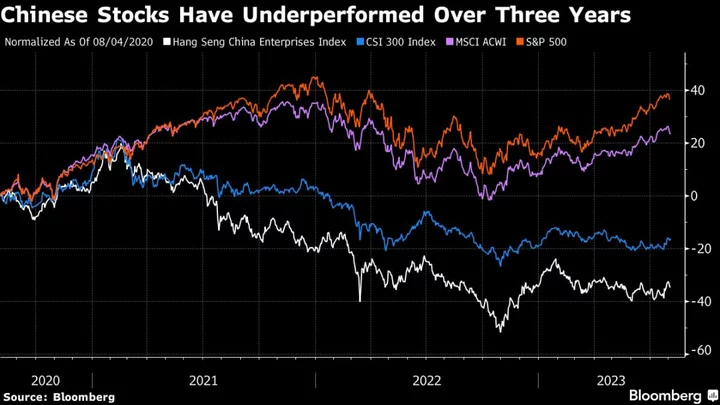
Rare China Vow on Market Support Puts Beijing’s Toolkit in Focus
An unusual display of China’s commitment to rejuvenating its capital markets has sparked newfound hopes among traders in
2023-08-04 10:22
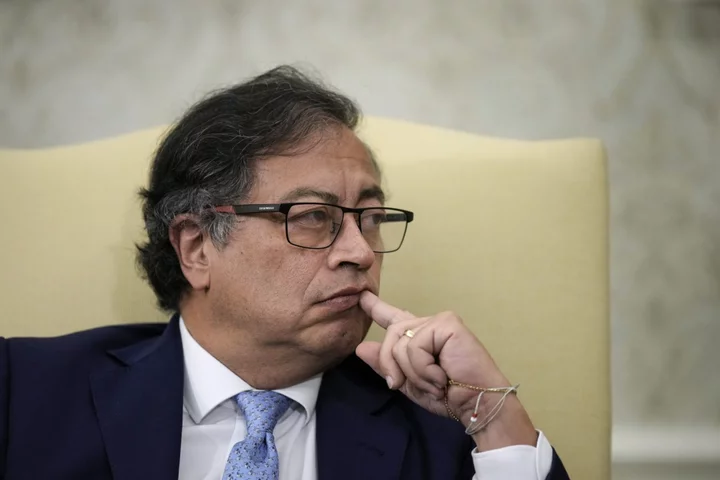
Colombia Prosecutor Says Criminals Financed Petro’s Campaign
The son of Colombian President Gustavo Petro said he would turn over evidence that money from crime found
2023-08-04 09:27
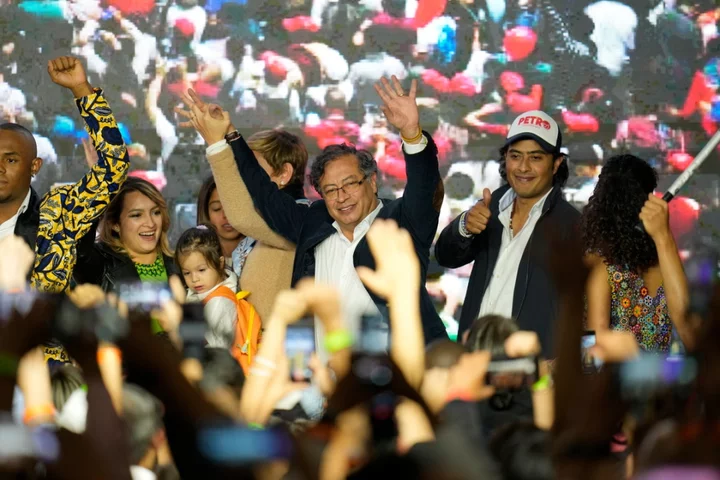
The son of Colombia's president says his father's election campaign received money of dubious origin
The son of Colombian President Gustavo Petro acknowledged Thursday that his father’s 2022 election campaign received money of dubious origin, according prosecutors investigating the son for alleged illicit enrichment and money laundering. Nicolás Petro, who was a legislator representing a northern coastal region, agreed to cooperate with prosecutors in the probe after being charged Tuesday. Prosecutor Mario Andrés Burgos, who heads the investigation, said the younger Petro has revealed that unjustified increases detected in his assets came from two individuals being questioned by Colombian authorities. The money went partly into his own accounts and partly into the campaign that made his father Colombia's first elected leftist president, the prosecutor said. On Tuesday, when he was charged, prosecutors said the younger Petro took thousands of dollars from drug traffickers and used it to buy luxurious homes and expensive cars. Nicolás Petro, 36, pleaded innocent to the charges, but agreed to cooperate with authorities. The case has come at a time when Colombia’s president is losing popularity and has been exposed to attacks by opposition parties, which have become increasingly reluctant to cooperate with his legislative agenda. The investigation stems from a shocking declaration made by the son's former wife, Daysuris Vásquez, to local news magazine Semana in March. Vasquez said she was present at meetings where Nicolás Petro arranged a 600 million peso ($150,000) donation from a politician who was once convicted in Washington of drug trafficking and who wanted to contribute to Gustavo Petro’s 2022 presidential campaign. She accused her ex-husband of pocketing the money and said that the father’s presidential campaign had no knowledge of the donation. On Thursday, prosecutors said the “resources” in the case were around $270,000 that was delivered by Samuel Santander Lopesierra and Gabriel Hilsaca to Nicolás Petro. Lopesierra was convicted and extradited to the United States, where he was sentenced for drug trafficking. Hilsaca is the son of Alfonso Hilsaca, who is currently being prosecuted on charges of murder and criminal conspiracy in Colombia. Burgos said the president’s son has promised to deliver audio recordings and documentary evidence that would corroborate that part of the money he received was used to finance his father’s electoral campaign without being duly reported to authorities.. Prosecutors also accused Vásquez of co-operating in the money laundering scheme and said she helped her husband hide thousands of dollars in cash in suitcases that the couple kept at their home. The couple, who no longer live together, were arrested Saturday and have been held at the headquarters of the Chief Prosecutor’s Office in Bogota. Thursday’s hearing was held to hear arguments on whether Nicolás Petro’s detention should be switched to house arrest. The president has said he would not interfere with the investigation, and wrote a message on X, the platform formerly known as Twitter, in which he said he hoped his son would “reflect on his mistakes.” Read More Ukraine war’s heaviest fight rages in east - follow live Charity boss speaks out over ‘traumatic’ encounter with royal aide Panama Canal foresees its income falling after shipping limited due to a drought Appeals court allows Biden asylum restrictions to temporarily stay in place as case plays out New Zealand to boost its defense capabilities as it faces increasing tensions in the Pacific
2023-08-04 09:22
